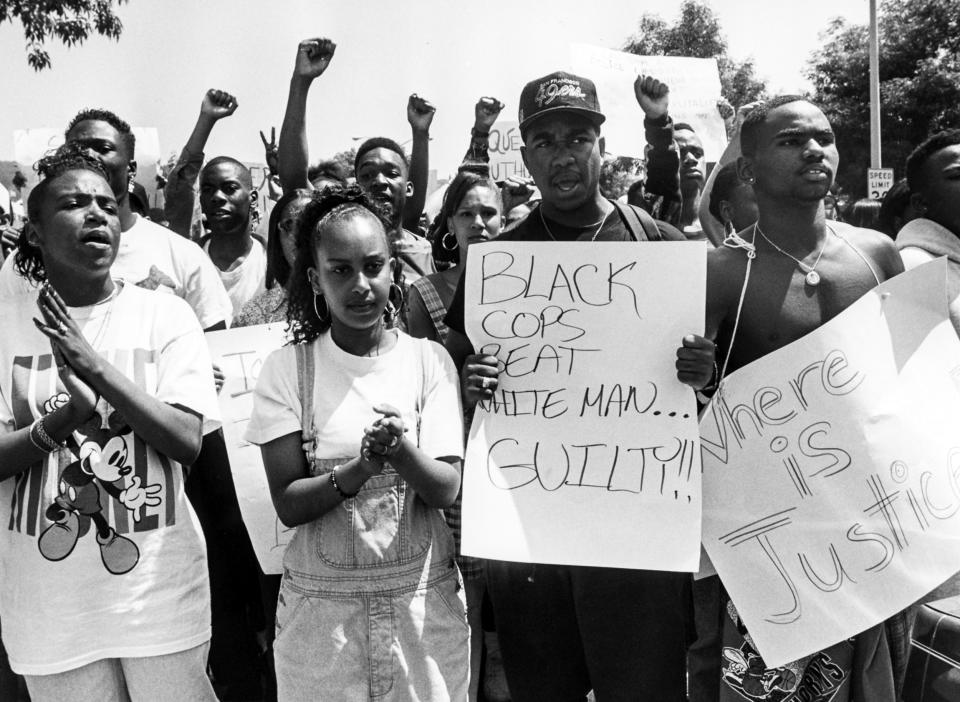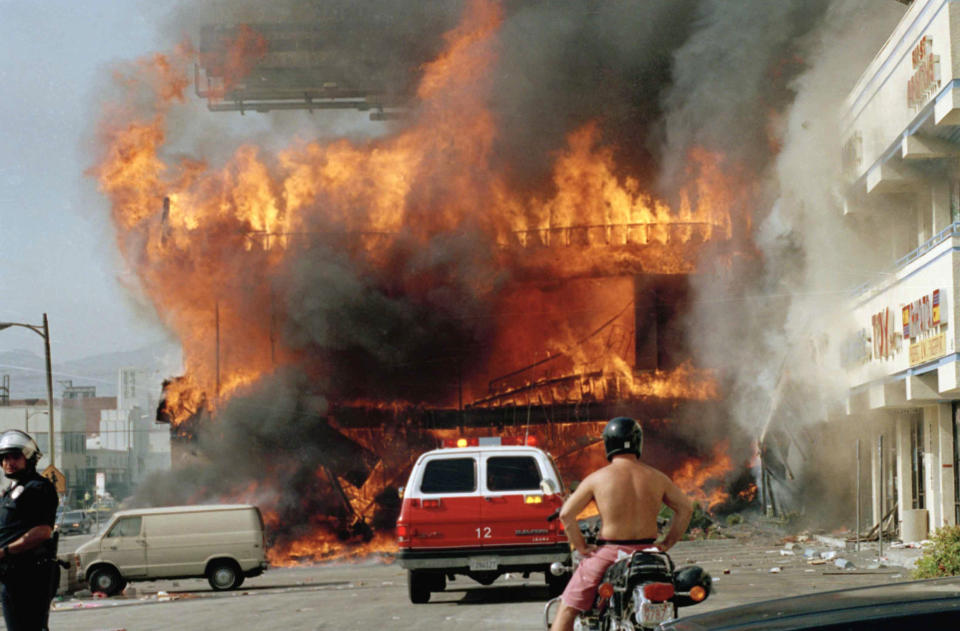L.A. riots were a 'tipping point' for Black Americans. Is another uprising inevitable?
- Oops!Something went wrong.Please try again later.
Ingrid Jones admitted her memory is not what it used to be. At 70, “I can go to the refrigerator and forget why I opened the door,” she said. But she said her recollection of 30 years ago is clear.
It was her 40th birthday. “But that’s not why I remember it so well,” she said. “I remember it because that was the day Los Angeles burned.”
L.A. was on fire because four police officers who were captured on camera beating Black motorist Rodney King in 1991 were acquitted of nearly all charges, including assault with a deadly weapon and use of excessive force, and deadlocked on one assault charge. The fallout became what is known now as the L.A. riots or the L.A. uprising.
The verdicts infuriated and pained — and, ultimately, ignited — a Black community that already had a combustible relationship with law enforcement and was on the precipice of exploding. Hours after the verdict, that anguish erupted into protests and violence, with more than 100 fires blazing across Los Angeles, killing at least 60 people and causing what was then a record-setting $775 million in damages. Protesters stopped traffic on the freeway and streets, attacked motorists and looted stores and buildings downtown.
“I was coming home from the hair salon,” Jones said. “It was during the week, a Wednesday. Was going to meet some friends to celebrate. I never made it out. The uprising started. I was upset earlier in the day with the verdict. I remember crying. They beat that man like that and got away with it? The message in that made me shed tears, and it made me angry. And you know what? Thirty years later and it still upsets me.”
Thirty years later and Los Angeles still feels the remnants of that event. King died in 2012 in an accidental drowning, but his words decades ago — “Can we all get along?” — resonate because the problems that led to the riot have languished.
The relationship between the Black community and law enforcement remains frigid. According to a Los Angeles Times analysis, Black people make up less than 10 percent of the population in L.A. County, but 24 percent of law enforcement killings. The economic disparities that concerned Black people in 1992 also persist today, including vast wealth inequality that affects multiple nonwhite groups. Remnants of the uprising still stand in the form of wrecked buildings never repaired.
Carl E. Douglas, an L.A. native and civil rights attorney who was on O.J. Simpson’s defense team, said the window for any sort of healing or change after the riot closed swiftly, as it has for other uprisings related to racial unrest.

After a few months, “the pendulum swings back the other way,” Douglas said. “That’s what happened in L.A. It’s the natural order of life in America — racism, economic oppression. So it’s not surprising that those issues continue. Racism is the reason. And until we are able to eliminate biases that are caused by our racial differences, which are fueled by our economic differences, which are powered by capitalism … there are going to be the haves and the have-nots.”
As for the relationship with law enforcement, Douglas said George Floyd’s murder in Minneapolis in 2020 — captured on video like King’s beating — indicates there has been little progress.
“As long as there is a warrior mentality permeating police forces nationwide, as opposed to a guardian mentality,” he said, “a culture of distrust will continue, and we will have this pendulum swinging back and forth.”
Jones lives in Gardena, not far from the epicenter of the tumult.
“I drive by the area where much of the activity took place, and it hurts that some of it still looks like it did in 1992. And that’s a shame,” she said. “The feeling that things are getting better isn’t there. It just isn’t.”
Community leaders are working to shift the paradigm with a campaign called SAIGU, which is both a Korean word for the date of the uprising, April 29, and an acronym meaning “serve, advocate, inspire, give and unite.” About $500 million worth of destruction occurred in Korean neighborhoods, and the relationship between Blacks, Koreans and Asians in L.A. remains shaky at best.
It will take that and more to make a difference, said Cecil Rhambo, the police chief at the Los Angeles International Airport. He was a police sergeant when the verdict was announced. The uprising was not a surprise to him.
“Intuitively, I knew that things were going to erupt when I heard the verdict,” said Rhambo, who is now running for L.A. County sheriff. “The community was already really, really upset about the whole issue of Rodney King in general, the way he was treated. The police chief at the time was Daryl Gates, who was always defensive of LAPD, making really inflammatory comments like Black people’s throats are different than other people.

“And so, it was just years of pressure built up, juxtaposed against the fact that in 1992 we also had the crack epidemic and gang wars going on. So the inner city was already kind of hot.”
Some elements of Black life have improved over the last three decades, but not so much that an unpopular verdict involving a Black person and white law enforcement would not ignite another explosion of emotions onto the streets, Rhambo said.
“There’s always a potential for riots or an uprising in the future,” he said. “Right now, inflation is running amok, largely in part due to what’s happening around the world that we can’t control. Covid hasn’t gone away. And so, I think there’s always an opportunity for things to get so bad that people repeat history.”
That history can be repeated, Rhambo said, because the potential for violence against Black people by law enforcement — with no one held accountable — remains strong.
“We just want to stop being mistreated by the police,” he said. “It’s just a basic common decency of how we treat people. That was the tipping point in 1992. If the George Floyd verdict had been different, I would not have been surprised if something happened. In the 1965 Watts riots and in ’92, it was the perfect storm that led to the violence. We have a perfect storm going on now that creates this powder keg. So there’s always a potential for that in the future.”
The way Douglas, the attorney, sees it, another uprising like 1992 is inevitable.
“Black people express their displeasure by uprising, and I’m not sure that’s gone away forever,” he said. “It’s the language of the streets. It’s the language of the unheard. Didn’t Martin Luther King say that? And he was right.”
CORRECTION (April 29, 2:23 p.m. ET): A previous version of this article misstated the first name of the police chief at the Los Angeles International Airport. He is Cecil Rhambo, not Cedric.

